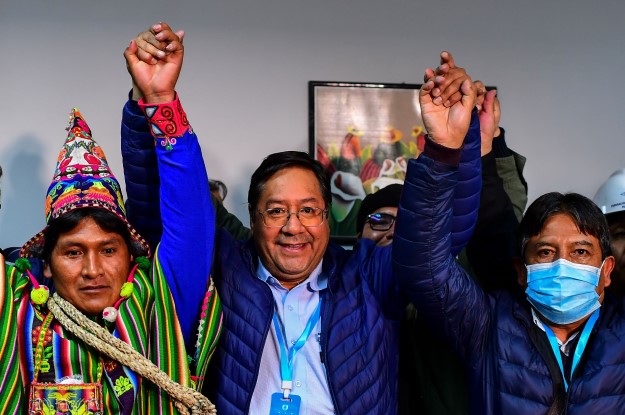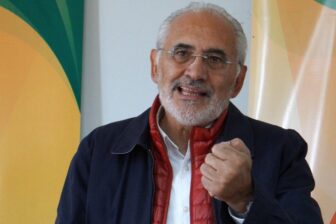MAS is on its way back.
Luis Arce, the economy minister under former President Evo Morales and the candidate for Morales’ Movement toward Socialism (MAS) party, defeated centrist candidate Carlos Mesa in Bolivia’s long-delayed general election. Arce, a technocrat often credited for the economy’s expansion during Morales’ 14 years in office, had a much larger margin of victory than was expected, though final results are pending. How’d he do it? And what can we expect next? AQ asked four experts to help us understand Arce’s victory.
Jorge Derpic, sociologist and professor at the University of Georgia:
“If there’s something we can learn from this election and the one last year, it’s that people in Bolivia are against authoritarian approaches. We can debate which one was worse – whether it was Morales’ government or Áñez’s, but I think that both responses at the ballot box and on the streets speak to a strong rejection from Bolivian society to attempts to stay in power for too long or to use power against opponents.
Looking ahead, I think we can expect Bolivia to return to closer relationships with Cuba, Venezuela and Nicaragua, and there will be some distance with the United States and Brazil, the countries that were really supporting Áñez.
Things look complicated for the economy. The good thing for the government, and probably for the country, is that it seems they may have a majority in congress, which should give them some stability. Hopefully the new government will learn from its past mistakes, and won’t try to circumvent the constitution again and shut down opposition within the party. I’m not that optimistic.
I think we should expect some attempts to investigate authorities from the Áñez administration, and I think that would be a fair thing to do because of its record of state violence. The fear is the use of the judicial system against political opponents, a practice pursued by Áñez but which also was also carried out by Morales. I fear again the pendulum will swing the other way.”
Evelyn Callapino Guarachi, political scientist at Domingo Savio Private University:
“Truthfully, Arce’s victory does not surprise me too much because MAS has worked hard to include rural areas in its party infrastructure. The messaging from the opposition to MAS was tired, and focused only on urban areas, excluding other sectors.
The questions I have are, for starters, who will really govern? Will it really be Arce? Will MAS’ agenda include the reconciliation of social sectors? And how will the government deal with the economic crisis? Going forward, given MAS’ track record of coopting institutions, it should be a priority that institutions are strengthened so that no one political party can have so much power.”
Raúl Peñaranda, director of the Bolivian news portal Brújula Digital:
“I think we can understand Arce’s triumph in part as a vote to punish the current government of Jeanine Áñez, whose negative rhetoric strengthened a MAS party that found itself weakened by the fall of Morales and divided into several factions. But the government’s aggressive rhetoric – its accusations, its marginalization, its message that ‘if you’re not with me, you’re against me’ – ultimately strengthened MAS and Arce’s candidacy.
The government lumped many MAS supporters in the same group, accusing them of being communists or of being corrupt or narco-terrorists. People who had abandoned Morales last year saw this and thought, ‘if this is what replaces Morales and MAS, then I’d rather go back to them.’ On top of this, voters remember the stability and growth that came during the 14 years of Morales’ government, before the pandemic and economic problems of today. Further, Arce’s opponents did little to reach out to indigenous voters, to incorporate them in their movements, which helps explain his victory.”
María Paz Salas, president of the Bolivian Association of Political Science:
“Hopefully the opposition learns that doing politics is about negotiating differences, but unfortunately they have gotten into fights over egos. It’s the same thing that has happened in Venezuela, Argentina, Mexico and possibly Ecuador next year.
The opposition to MAS did not understand that it was up against a nationally organized party and its highly-skilled politicians. Politics is supposed to be a means of overcoming differences, but opposition politicians did not have the ability to set a single goal: defeat MAS.”







